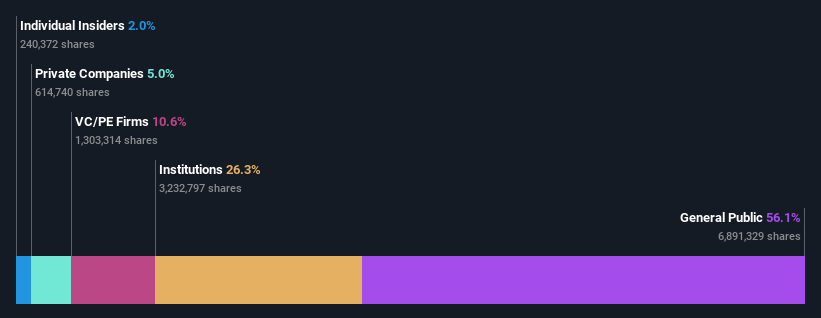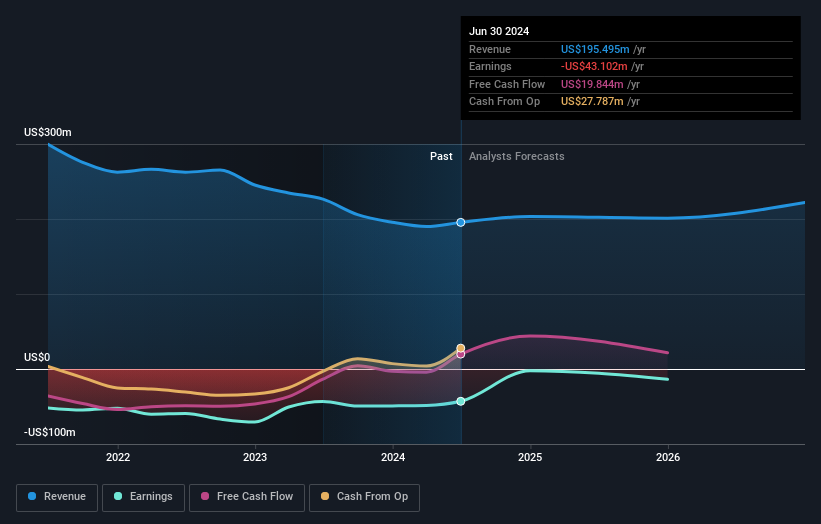- United States
- /
- Communications
- /
- NasdaqGS:INSG
Painful week for retail investors invested in Inseego Corp. (NASDAQ:INSG) after 28% drop, institutions also suffered losses

Key Insights
- Inseego's significant retail investors ownership suggests that the key decisions are influenced by shareholders from the larger public
- 42% of the business is held by the top 25 shareholders
- 26% of Inseego is held by Institutions
Every investor in Inseego Corp. (NASDAQ:INSG) should be aware of the most powerful shareholder groups. The group holding the most number of shares in the company, around 56% to be precise, is retail investors. In other words, the group stands to gain the most (or lose the most) from their investment into the company.
While the holdings of retail investors took a hit after last week’s 28% price drop, institutions with their 26% holdings also suffered.
In the chart below, we zoom in on the different ownership groups of Inseego.
View our latest analysis for Inseego

What Does The Institutional Ownership Tell Us About Inseego?
Institutions typically measure themselves against a benchmark when reporting to their own investors, so they often become more enthusiastic about a stock once it's included in a major index. We would expect most companies to have some institutions on the register, especially if they are growing.
Inseego already has institutions on the share registry. Indeed, they own a respectable stake in the company. This can indicate that the company has a certain degree of credibility in the investment community. However, it is best to be wary of relying on the supposed validation that comes with institutional investors. They too, get it wrong sometimes. When multiple institutions own a stock, there's always a risk that they are in a 'crowded trade'. When such a trade goes wrong, multiple parties may compete to sell stock fast. This risk is higher in a company without a history of growth. You can see Inseego's historic earnings and revenue below, but keep in mind there's always more to the story.

We note that hedge funds don't have a meaningful investment in Inseego. The company's largest shareholder is Tavistock Life Sciences, with ownership of 11%. The second and third largest shareholders are Braslyn Ltd and Simplicity Wealth LLC, with an equal amount of shares to their name at 6.2%.
Our studies suggest that the top 25 shareholders collectively control less than half of the company's shares, meaning that the company's shares are widely disseminated and there is no dominant shareholder.
While it makes sense to study institutional ownership data for a company, it also makes sense to study analyst sentiments to know which way the wind is blowing. Quite a few analysts cover the stock, so you could look into forecast growth quite easily.
Insider Ownership Of Inseego
While the precise definition of an insider can be subjective, almost everyone considers board members to be insiders. Management ultimately answers to the board. However, it is not uncommon for managers to be executive board members, especially if they are a founder or the CEO.
Insider ownership is positive when it signals leadership are thinking like the true owners of the company. However, high insider ownership can also give immense power to a small group within the company. This can be negative in some circumstances.
We can report that insiders do own shares in Inseego Corp.. It has a market capitalization of just US$133m, and insiders have US$2.6m worth of shares, in their own names. It is good to see some investment by insiders, but we usually like to see higher insider holdings. It might be worth checking if those insiders have been buying.
General Public Ownership
The general public, mostly comprising of individual investors, collectively holds 56% of Inseego shares. This size of ownership gives investors from the general public some collective power. They can and probably do influence decisions on executive compensation, dividend policies and proposed business acquisitions.
Private Equity Ownership
Private equity firms hold a 11% stake in Inseego. This suggests they can be influential in key policy decisions. Some might like this, because private equity are sometimes activists who hold management accountable. But other times, private equity is selling out, having taking the company public.
Private Company Ownership
Our data indicates that Private Companies hold 5.0%, of the company's shares. Private companies may be related parties. Sometimes insiders have an interest in a public company through a holding in a private company, rather than in their own capacity as an individual. While it's hard to draw any broad stroke conclusions, it is worth noting as an area for further research.
Next Steps:
It's always worth thinking about the different groups who own shares in a company. But to understand Inseego better, we need to consider many other factors. Like risks, for instance. Every company has them, and we've spotted 4 warning signs for Inseego (of which 2 are a bit unpleasant!) you should know about.
But ultimately it is the future, not the past, that will determine how well the owners of this business will do. Therefore we think it advisable to take a look at this free report showing whether analysts are predicting a brighter future.
NB: Figures in this article are calculated using data from the last twelve months, which refer to the 12-month period ending on the last date of the month the financial statement is dated. This may not be consistent with full year annual report figures.
New: AI Stock Screener & Alerts
Our new AI Stock Screener scans the market every day to uncover opportunities.
• Dividend Powerhouses (3%+ Yield)
• Undervalued Small Caps with Insider Buying
• High growth Tech and AI Companies
Or build your own from over 50 metrics.
Have feedback on this article? Concerned about the content? Get in touch with us directly. Alternatively, email editorial-team (at) simplywallst.com.
This article by Simply Wall St is general in nature. We provide commentary based on historical data and analyst forecasts only using an unbiased methodology and our articles are not intended to be financial advice. It does not constitute a recommendation to buy or sell any stock, and does not take account of your objectives, or your financial situation. We aim to bring you long-term focused analysis driven by fundamental data. Note that our analysis may not factor in the latest price-sensitive company announcements or qualitative material. Simply Wall St has no position in any stocks mentioned.
About NasdaqGS:INSG
Inseego
Engages in the design and development of cloud-managed wireless wide area network (WAN) and intelligent edge solutions for businesses, consumers, and governments worldwide.
Undervalued slight.


